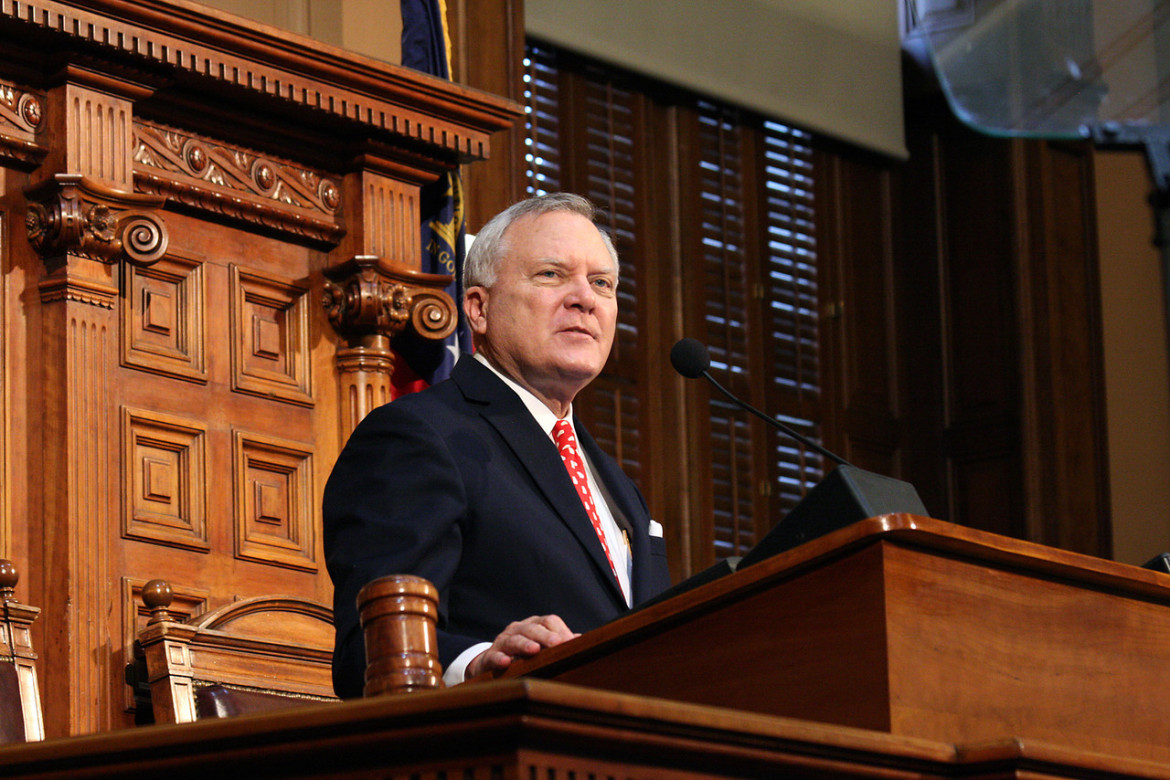
Governor Deal at the 2013 State of Address to the Georgia General Assembly
Georgia Gov. Nathan Deal is asking the state legislature to spend $5 million dollars to set up community diversion programs for low-risk youth offenders, on the model of other states.
The appropriation would “create an incentive funding program” to encourage communities to treat appropriate youth at home, Deal told lawmakers at his annual State of the State address on Jan. 17.
“We would emphasize community-based, non-confinement correctional methods for low-risk offenders as an alternative to regional and state youth centers,” Deal said, options like substance abuse treatment and family counseling.
He emphasized the chance to save money, saying every secure bed in a Youth Detention Center, a facility for longer-term sentences, costs $91,000 annually.
In tight budget times, $5 million shows a definite commitment, said Pat Willis, executive director of Voices for Georgia’s Children, who praised the proposal. “It’s not money just to keep doing just what people have been doing. It’s really money that will help local jurisdictions find good ways to resolve some of the problems kids have locally.”
In Ohio and Texas, where such reforms have been enacted over the past dozen years, communities have set up programs like Deal mentioned, as well as other initiatives such as community service, restorative justice and even equine therapy.
In his speech, Deal thanked the authors of the proposal, the Georgia Criminal Justice Reform Council, a blue-ribbon panel of legislators, judges and attorneys that researched juvenile justice reforms over the last seven months.
A bill to make the changes in Georgia is still being drafted.
“It’s almost like a pilot,” said Debra Nesbit, associate legislative director of the Association County Commissioners of Georgia. Against the big picture of a state budget totalling some $20 billion for the fiscal year beginning this July, Deal’s $5 million request is fairly little. “It’s intended to look at the communities where the largest number of commitments are coming from,” said Nesbit.
She said she worked with the Council over the summer and doesn’t believe counties will be stuck with new costs for the programs.
“It’s my understanding that it will be cost-neutral” to the counties, she said, adding that she will be reviewing the bill when it comes out.
If the Georgia General Assembly makes the $5 million appropriation, counties or, perhaps, other jurisdictions would apply for a piece. Some communities may be fairly well prepared, with juvenile service talent close at hand. Others may struggle to attract and build up the expertise to set up juvenile diversionary programs.
The state House set up a new Juvenile Justice Committee just days before Deal’s speech. With 27 members, it’s one of the legislature’s largest committees. And if it’s put in charge of hearing the bill, prospects for passage may be good: two of its members, state representatives Mary Margaret Oliver (D-Decatur) and Willie Talton (R-Warner Robins) sat on the Council.
The Georgia House and Senate begin budget hearings on Jan. 22. They must pass a budget by the end of their session, likely some time in April.
Photo courtesy of The Office of the Governor.
